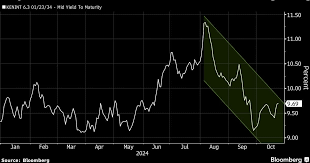Global Investors Look Past Turmoil to Boost Kenya Asset Bets
The vice president wields little power in Kenya’s government, and his removal wouldn’t herald any change in policy, said Ronald Muyanja, head of East Africa trading at Citibank NA Kenya.
- Advertisement -
The worst political upheaval in years hasn’t taken the shine off Kenya’s top-performing currency and rallying bond and stock markets as investors focus on an improving economy and healthy capital inflows.
The Kenyan High Court is reviewing a decision by lawmakers to impeach Vice President Rigathi Gachagua. That’s prolonging a power struggle between Gachagua and President William Ruto, who is trying to reassert control after public protests earlier this year against planned tax increases sparked clashes that left at least 60 people dead.
- Advertisement -
But amidst the turmoil, the shilling remains the best-performing currency in the world this year; the country’s dollar bonds have outstripped most emerging-market peers; and the stock benchmark is up more than 20%.
- Advertisement -
The vice president wields little power in Kenya’s government, and his removal wouldn’t herald any change in policy, said Ronald Muyanja, head of East Africa trading at Citibank NA Kenya.
“At the moment, there are more significant economic factors that are driving Kenyan local assets than the headlines from the VP impeachment,” Muyania said. “The market sees Kenya at a totally different footing than where it was at the beginning of this year.”
Kenya’s dollar bonds were roiled during the anti-tax protests, with the yield on 10-year securities rising to a nine-month high of 11.44% in early August. Since then, the yield has dropped 1.75 percentage points to 9.69%. The country’s eurobonds have handed investors a return of 10% in that period, more than four times the emerging-market average.
The shilling hit a record low against the dollar in January, but has since rebounded 27%, buoyed by the successful issuance of a $1.5 billion eurobond that was used to repay other debt. The next disbursement of Kenya’s $3.9 billion International Monetary Fund loan, due at the end of October, is also boosting optimism, according to Ebury Partners Ltd.
- Advertisement -
“A key factor alleviating fiscal pessimism is Kenya’s robust access to external funding,” which offset concerns about lower tax revenue following the protests, Eduardo Moutinho, a market analyst at the London-based advisory firm, wrote in a report. “On the economic front, the outlook also appears to be improving.”
Kenyan Central Bank Governor Kamau Thugge said Wednesday that the shilling is now at appropriate levels, and that policy makers are prepared to use record foreign reserves to defend the currency. The currency was steady at 128.99 per dollar on Thursday.
A moderation in inflation has pushed the real interest rate to 8.4%, the highest in the region, even after the central started an easing cycle in August, Moutinho said. Kenya’s economy is also expanding faster than peers, with growth of 5% in the first quarter on the back of strong performances in agriculture and services.
Against this backdrop, Gachague’s impeachment, if upheld by the court, could be a “positive development” as it seeks to address corruption which has stifled economic progress, according to Oxford Economics.
Lawmakers agreed to impeach Gachagua on five charges, including gross constitutional violations. His lawyers argue the allegations are unfounded and lacked evidence and asked courts to block the nomination of a new deputy president pending the case hearing.
“The market is observing developments and deliberating on how this will actually impact effecting policy changes going forward,” said Samantha Singh-Jami, an Africa strategist at Rand Merchant Bank.
Source:norvanreports.com
- Advertisement -


